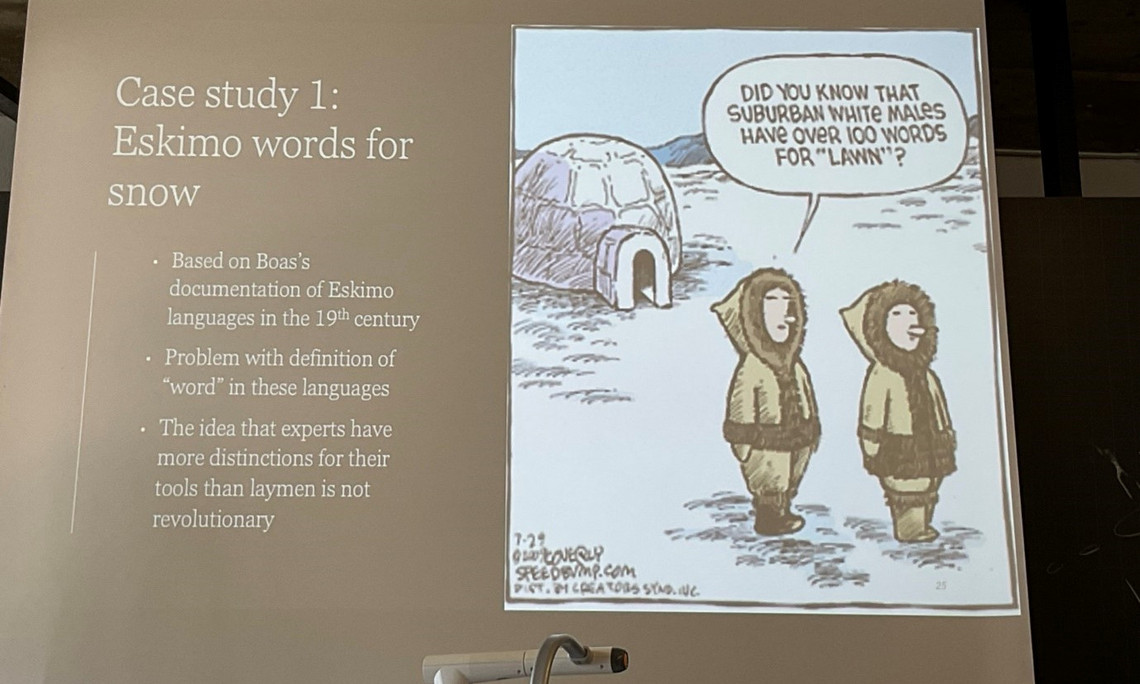We started off our second ToK day by listening to two presentations of our classmates about their ToK summer reading.
After the presentations, we started off with our topic of the day, “Knowledge and the Language”. First, we discussed how language and knowledge are connected. The connection between these two is, that knowledge can be communicated, and for communication, language is needed. Language is used to gain, process, justify and share knowledge.
This topic, then got divided into three parts, starting off with Language and ToK, where we discussed the scope, perspectives, methods and tools and the ethics of language.
A short summary to these discussed topics: The defining characteristics of language include semanticity, arbitrariness, displacement, productivity, traditional transmission, and duality. With over 6,000 languages spoken today, language can shape knowledge, as some languages lack numbers or gendered nouns. Certain phrases are also untranslatable, potentially leading to knowledge loss. Learning one's native language happens naturally through exposure, but acquiring a foreign language is harder without immersion. In ethics, language can be misused through cursing or power dynamics, and dialects can influence how respect and class are perceived in certain societies.
Gaja Gorecka, Irina Lomakova und Alma Bender-Freisinger, 5i
Then we moved on to the next big question: “What is language?”. To answer this question, we first tried to define it ourselves in small groups, before gathering our definitions, to create one general one, before comparing it to the one written by David Crystal. The key-features are: language is rule governed, intended (symbols by means of which humans, express themselves), creative and open-minded.
As we then dived into the topic “Meaning and understanding”, we had to answer certain questions to a text, which was mostly made of names and words, which do not exist in the English language, to show us, that although we didn’t know certain terms, we could still understand the meaning of the text to a certain degree. This example showed us how crucial context is in the use of language, as it can influence the meaning of any phrase or word.
To introduce the next topic “Language and Culture”, we read three theories on this very subject. These theories told us, that we as humans have a universal grammar instinct (Noam Chomsky), all languages are tools of the culture using them (Daniel Everett) and that the world is divided into smaller worlds, by language, as it allows us to even hear and see otherwise (Edward Sapir, Benjamin Whorf). Afterwards, we received a few links and an app, on which we could explore or find our dialect, this was an interesting experience, as some people ended up with places they’ve never even been to. To finish off, we watched two videos, one called “My Fair Lady”, which was a snippet from a movie, and a TED talk held by John Baugh. These two videos were supposed to demonstrate how in the past and even nowadays, people tend to judge somebody based on their accent, immediately assuming their status, religion or even lifestyle. And although this might not be a major issue in Switzerland, it’s still very visible in other countries.
As a last subject, we looked at the origins of language. To this topic we watched two TED talks, “The Origins and Evolution of Language”, held by Michael Corballis and “How language began”, held by Dan Everett. We then summarized them, and decided on which theory is more believable, to which most students agreed on the theory presented by Dan Everett, as it involves the human evolution in its explanation. Showing how with only two sounds one can create a language, and how there is proof that the Homo Erectus had communicated and how the language had evolved using icons and symbols.
In the afternoon session, we had the chance to continue our ToK day with Kevin Bätscher. He is a linguist and mainly works in the documentation of traditional languages. He started the afternoon with an introduction round. Everybody in our class had to quickly explain their linguistic background, which was interesting since we have a big diversity in our class. He then presented his background, which is pretty much only Swiss-German, and why he now speaks about 10-12 languages fluently. We learned about the different work strands of linguists and what a linguist is in general.
Afterwards we had an interesting discussion about whether our worldview can impact prejudice, where our class got divided into two groups to find arguments for and against the idea. After that, four different case studies were introduced to us that had some correlation to linguistics. One example that many found particularly interesting was the fact that Eskimos have a lot of different words for snow. Another fascinating fact was that languages differ in color split, meaning different nations have varying abilities to recall color shades. Overall, this was a very interesting day.
